In a survey of The Local’s readers that attracted more than 100 responses, a common theme emerged time and time again: the government needs to be clear with people about the rules and clarify points of confusion.
Currently, a so-called ‘2G-plus’ policy applies in most catering businesses, meaning people either need to have three shots of vaccine or two shots and a negative test in order to enter.
However, the Health Ministry has attracted sharp criticism for changing the rules on the recovery status and the status of people who’ve had the Johnson & Johnson vaccine without any warning. According to our readers, the past month or so has seen many people scrambling to get their head around the new rules and stay abreast of the constant changes.
READ ALSO:
- Covid ‘recovered’ status only valid for three months, says German Health Ministry
- Millions of Germans no longer considered ‘fully vaccinated’ on public transport
“It’s very confusing trying to figure out the current rules,” said Laerke, 29, who lives in Berlin. “There are too many changes, and they’re implemented so quickly and communicated so badly that most people don’t know what is a rule and what’s just talk.”
“Confusing, ever-changing, and infuriating,” said 53-year-old Berliner Robert. “These rules and their ridiculous implementations are causing as much, possibly more, hardship for people than the actual virus.”
While the federal government and states have been working to unify their approach, there also seems to be differences in the application of the 2G-plus rules in different parts of the country.
According to 39-year-old Noa Freilich Pollack from Göttingen, the state of Lower Saxony has allowed businesses to diverge from the 2G-plus regulations if they keep capacity down to 70 percent instead – an exception that many businesses have taken advantage of.
“I can understand the businesses,” she said. “However this makes me feel less safe and I’ve reduced my visits to coffee shops and other places due to that.”
Mainz resident Russell Parker, 58, told us that Rheinland-Pfalz was an “early adopter” of the 2G-plus rule, but said that so far only the bigger companies were consistently enforcing it.
Other readers said they had struggled to convince business owners that their booster jab could be used instead of a negative test, or had found themselves disadvantaged by the fact that they had a combination of vaccinations and Covid infections.
Gordon Barnes, 47, called for clearer communication on the rules so that everyone understood what could be used as proof.
“There needs to be clearer explanations that a recovered status expires and people still need vaccines,” the Munich resident told us. “This hasn’t affected me but I know people who are confused.”
Bremen resident Anuj Sehgal, 34, agreed that there should be “better clarity” on what evidence qualifies for 2G-plus.
“The rules are now too confusing for people who have recovered, have only one shot of J&J, and so on,” Sehgal said. “Too many combinations.”
READ ALSO: What documents do you need to carry for Germany’s 2G-plus restrictions?
‘Give people time’
Of more than 100 respondents to the survey, just three people openly said they were unvaccinated, while two further respondents were unwilling to reveal their status.
Just over 56 percent of people had received three doses of vaccine, while one person said they had already had two booster shots. Around a quarter of respondents had had two shots of vaccine (including people who’d had Johnson & Johnson and another vaccine), while others had either had just one shot of J&J or a combination of jabs and infections.
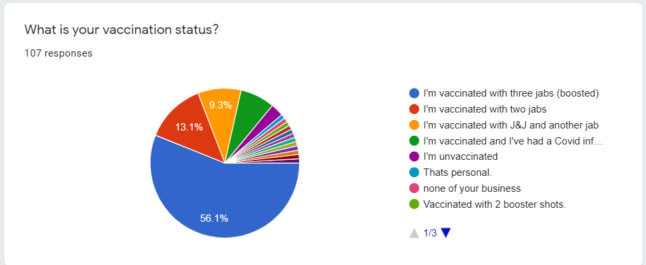
With more than one in ten people revealing that they had opted for J&J, the decision to downgrade recipients of the previously one-shot vaccine to ‘unvaccinated’ overnight was a major source of frustration.
“A few days ago I was in 2G-plus – today I’m not,” said Mohammed, 31, who lives in Hamburg. “The government should think in a more long term way, not just make overnight decisions.”
Jorge in Berlin had a similar view.
“For the people with J&J, which were downgraded, it would be fair to let them keep their booster (status) until they can get the third vaccine,” the 36-year-old told us. “I took that vaccine even though it was not recommended for my age – and now I’m penalised for being too rücksichtsvoll (considerate).”
One respondent was also reluctant to take a further shot after their initial dose of J&J as getting the jab in the first place had been a “major compromise” for them.
READ ALSO: What people who’ve had the J&J jab need to know for travel to Germany
Beyond the changes to the Johnson & Johnson vaccine status and the reduction of the recovery status to three months (down from six), there was a sense of frustration that people who were trying their best to follow the rules were still being tripped up.
In one particularly horrendous case of catch-22, Dmitry in Munich found himself unable to take his young son to be vaccinated because the 3G rules on public transport meant they needed a negative test – and the nearest testing centre could only be reached via bus or train.
“I would like things to be planned better,” said 32-year-old Bremen resident Hannah. “If they change the rules, people should have time to make themselves compliant before they come into effect.”
‘I feel safer’
Not everyone was critical of the tougher rules, however.
Many people argued that the high infection rates in Germany made strict policies like 2G-plus necessary, while others said that the restricted entry for unvaccinated people made them feel safer.
“In some ways I think it’s nice to know that if I’m at a restaurant all the other people there are also vaccinated,” said Amanda Naimy, 45, who lives in Oberursel. “It feels a bit safer but I don’t think this is sustainable in the long-run.”
For some people, staying informed was the key to avoiding nasty surprises when heading out in the evenings.
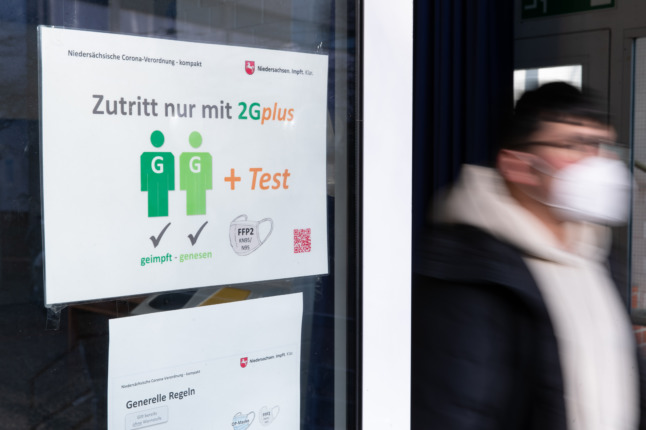
“I’ve never been turned away and I’ve always read the rules before I go to a certain venue,” said Alex, 31, Berlin. “If I need to be tested, I always do it ahead of time.”
A few people were even keen to see 2G-plus apply to a wider range of venues so that vulnerable people had more protection.
“I would like to see 2G-plus also apply to hair salons, so I can stop putting off getting my hair cut,” said Cheryl Hornung, 74, from Marburg. “My hair stylist is high-risk. He and so many others like him might not survive a Covid infection.”
‘Change their minds’
With the vast majority of our respondents already fully vaccinated, a large number of them were keen to see the government focus on convincing vaccine sceptics rather than putting ever-stricter entry policies in place.
“Instead of forcing people with rules about vaccines, increasing awareness and inspiring people into self motivated action should be the principle,” said 34-year-old Siva in Bremen.
“3G or 2G are okay, but instead of advising people to get the booster, they need to give some advice to the people who are reluctant to take the vaccine,” agreed 34-year-old Kumar from North Rhine-Westphalia. “They should try to change the minds of anti-vaccine people.”
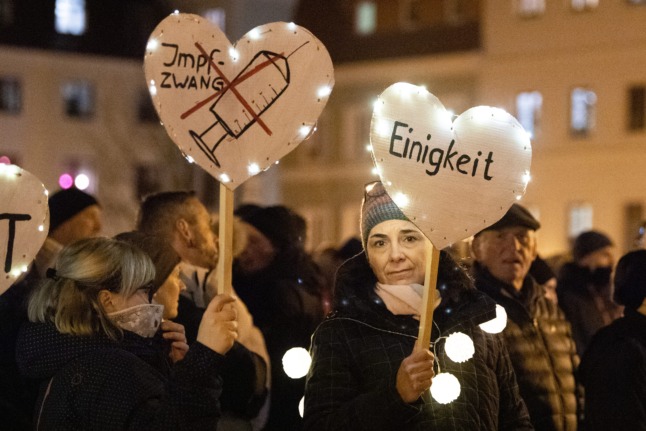
In a sign of increasing pandemic weariness, a handful of people argued that Germany should be going the way of Sweden of the UK and lifting all Covid restrictions entirely.
Hamburg resident Peter, 59, was one of the voices calling for a return to normality.
“Pressure on the health service is very sad, but you can’t stop society to reduce that – it’s well out of balance as a response,” he said. “The government has had two years to build up the health service capacity. The rest of society shouldn’t suffer because of this failure.”
READ ALSO: KEY POINTS: How Germany will tackle latest phase of the Omicron wave
Niall, who lives in Berlin, said he thought the focus on booster jabs was a good thing – but argued strongly in favour of basing measures on intensive care ward figures rather than infections.
“Vaccines prevent disease, not infection,” he said. “In a post-vax world we are now past the point of needing to track infection, which is inevitable.”
Asked for his opinions on the 2G-plus rules, he argued that the German government was “scaring the wrong people” by placing more controls and contact restrictions on the vaccinated.
“The people who should be scared don’t give a damn, and are prolonging this dystopian feeling for all of us,” he added.

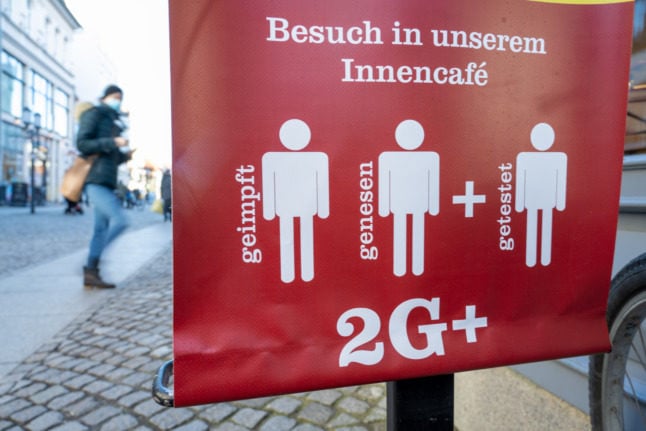
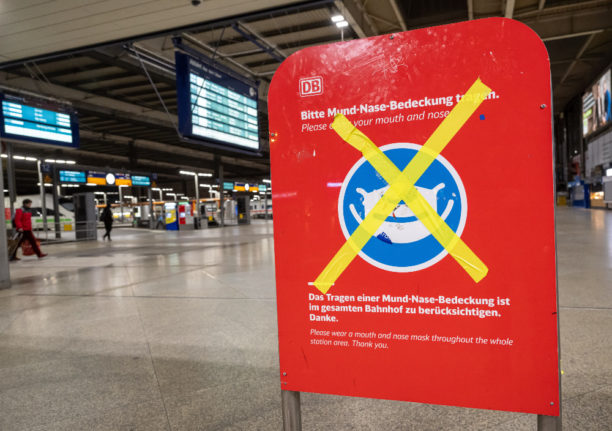
 Please whitelist us to continue reading.
Please whitelist us to continue reading.
If you’ve ever watched a world war 2 documentary and wondered, how did the people in Germany let the holocaust happen.
Look no further.
Thanks Flynn – you are absolutely correct.
I am not vaccinated through MY choice.
Fortunately I am too old to worry about the nefarious threats of ‘penalisation’.
I do however feel disgusted at the effect of ever changing conditions being imposed on those who are less able to bear the opportunistic dictates.
Good for you. Its nice to hear someone has made their own choice.
I worry for the freedom of my kids. Freedoms once relinquished. Are very rarely returned.
“However, top virologist Christian Drosten warned that the situation between Denmark – which eased all restrictions this week – and Germany cannot be compared one-on-one.”
“He said Denmark had achieved higher vaccination coverage than Germany.”
German population is over 14 times that of Denmark – so it is reasonable to believe that a major advisor to Political entities is ‘speaking with forked tongue’.